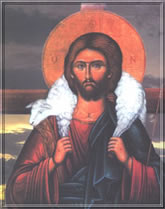- Arabic Corner
- Audio
- Bible Study
- Coptic Reader
- Children's Corner
- Deacons
- Evangelism & Apologetics
- Evangelism Pamphlets
- Interesting Facts
- Literature
- Pigori Productions
- Priests Corner
- Questions & Answers
- Reading Recommended
- Saintly Studies
- Servants Guide
- Sunday School Curriculum
- Sunday School Curriculum-Special Needs
- Youth Corner
The Lord Jesus Christ THE Passover Lamb
![]() Print
|
Print
|
![]() Send to a friend
|
Send to a friend
|
![]() Bookmark
|
Tweet
|
Bookmark
|
Tweet
|
![]() Back
Back

"For Christ our Passover Lamb, has been sacrificed." (I Corinthians 5:7)
(Most Biblical references apply the term "Passover" to the Paschal meal and the Feast of Unleavened Bread which followed. The Hebrew word for Passover, "pesach," is derived from the verb that means "to pass over".)
The celebration of the Passover and the correlating feast was instituted by God Himself to commemorate the deliverance of the Israelites from Egyptian bondage and the sparing of their firstborn when the destroying angel smote the firstborn of the Egyptians.
"It is the Passover sacrifice to the Lord, for He passed over the houses of the Israelites in Egypt, when He struck down the Egyptians" (Exodus 12:27).
History would also record this deliverance as the birthday of the Hebrew Nation. It was to be Israel's freedom day celebration.
The celebration of the Passover entailed either a lamb or kid being selected from the Israelite flock, of the first year, without blemish. The lamb was to be killed while the sun was setting. The blood was to be caught in a basin and with a sprig of hyssop the blood was to be placed upon the two side posts and the lintel of the door of the Israelite house. The whole lamb was then roasted to be eaten with bitter herbs and unleavened bread. Not one bone of the lamb could be broken. The lamb's flesh was to be entirely consumed and if it was not, the flesh had to be burned.
Within the Lord Jesus Christ's death upon the Holy Cross the true meaning of the Jewish sacrifice of the Passover lamb was fulfilled. At the time of Passover, it was the custom to release one prisoner of the people's choice. Pilate, the Roman governor, offered the people the choice of releasing the Lord Jesus Christ or Barabbas. The people chose to have Barabbas, a man imprisoned for sedition and murder, released and the Lord Jesus Christ crucified.
The Prophet Isaiah said, "He was oppressed and afflicted, yet He did not open His mouth; He was led like a lamb to the slaughter and as a sheep before her shearers' is silent, so He did not open His mouth" (Isaiah 53:7).
St. John the Beloved uses the figure of the lamb in his expression "Lamb of God" in his Holy Gospel twice. Church fathers believe this expression to be in reference to the lamb offered at Passover. This expression, "Lamb of God," is only found in St. John's Gospel and signifies that the Lord Jesus Christ would be the TRUE sacrifice (The Lamb) which would atone for the sins of the world.
"Look, the Lamb of God, who takes away the sin of the world!" (John 1: 29).
When the Lord Jesus Christ entered into Jerusalem on Hosanna Sunday more than likely He was greeted by those traveling early to purify themselves for the Passover sacrifice. "When it was almost time for the Jewish Passover, many went up from the country to Jerusalem for their ceremonial cleansing, before the Passover" (John 11:55).
The Lord Jesus Christ celebrated Passover with His disciples Thursday evening (The Last Supper). On Friday during the Passover, the Lord Jesus Christ would be crucified in Jerusalem. The Glorious Resurrection would follow on the Sunday after His Crucifixion.
Therefore, our beloved Lord Jesus Christ, the Lamb of God, was crucified on Passover day, a celebration that began the evening before when the Passover meal was partaken of.
"Christ is called a Sheep and a Lamb who was to be slainChrist is also called a StoneHe Himself is both Judge and King" (Cyprian c.250).
From this the Passover can further be personally viewed for those of us today as a type of delivery from the bondage and slavery of sin. Through the Lord Jesus Christ we are passed over from the darkness and doom we rightly deserve for all our many sins.
The Passover meal was eaten with bitter herbs and our bitter herbs should be those of repentance and confession. The Passover was not complete unless the lamb was consumed and so our lives are not complete unless we partake of His Body and Blood through the Sacrament of Holy Communion following repentance and confession of our many sins.
Last, as the Israelites ate their Passover meal in anticipation of a journey to come so we must all joyously anticipate our journey of thankfulness, worship, and active service to the Lord Jesus Christ on route toward the Heavenly life.
May we all meditate upon the TRUE Passover Lamb this Holy Week.
H.G. Bishop Youssef
Bishop, Coptic Orthodox Diocese of the Southern United States
![]() Print
|
Print
|
![]() Send to a friend
|
Send to a friend
|
![]() Bookmark
|
Tweet
|
Bookmark
|
Tweet
|
![]() Back
Back